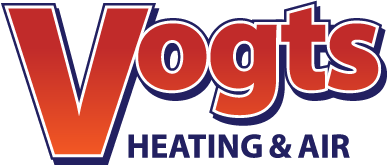
If you’re uncertain whether your Pocatello home has poor indoor air quality (IAQ), it likely does.
We are indoors a lot. As a matter of fact, we’re indoors up to 90% of the time, according to the U.S. Environmental Protection Agency. And the air inside residences could be 2–5 times more polluted than outdoors, which can create long-term health problems.
Most Common Origins of Unsatisfactory IAQ
We’ve put together a list of the most common origins of poor IAQ, the troubles they make and how you can fix these indoor air pollutants. If you’re worried about the air inside your house, we recommend talking with a pro like Vogts Heating & Air about which products are best for your home.
Volatile Organic Compounds
Volatile organic compounds, or VOCs, are chemicals leaked by everyday household products.
They’re found in paint and stains in addition to:
- Furniture
- Carpet
- Building materials
- Cleaning products
- Cosmetics
- Air fresheners
- Candles
When these chemicals accumulate indoors, they can irritate your eyes, nose and throat. They can also cause headaches and nausea. Regardless of whether your home is in a rural or industrial location, an EPA study found indoor levels of these chemicals can be 2–5 times higher than the air outside.
Always adhere to the manufacturer’s guidelines when using paint or cleaning supplies. Cracking a window can help fumes disappear faster.
Air purification systems can also improve your air. This system partners with your heating and cooling unit to freshen indoor air. When hunting for a system, ensure it’s specifically made to wipe out VOCs.
Dust and Pet Dander
Dust and pet dander can irritate health problems like asthma and allergies, especially when it continuously gets recirculated by your house’s comfort unit. While you can vacuum more regularly and buy an improved air filter, an air filtration system might be a better fit.
This equipment hooks to your heating and cooling equipment to provide strong filtration. Some models provide hospital-level filtration for getting rid of particles and bioaerosols.
Persistent Odors
New residences are closely sealed to boost energy efficiency. While this is great for your heating and cooling bill, it’s not ideal for your IAQ.
Musty odors can stick around for a greater amount of time as your residence is pulling in less fresh air. As keeping your windows open all year-round isn’t a possibility, here are two ways you can make your indoor air smell cleaner.
An air purification system is placed in your HVAC system to neutralize odors before they get released again. Search for one with a carbon filter and the power to break down harmful VOCs. This equipment can also help keep your family healthy by eliminating most bacteria and normal allergy triggers like pollen and mold spores.
A ventilation system pulls out musty indoor air and exchanges it with fresh outdoor air. There are two models of units (heat recovery and energy recovery), so check with our professionals for more details on which solution is ideal for your house.
Uneven Humidity
It’s essential your residence’s humidity stays even. Air that’s too moist can cause mold, while dry air can lead to respiratory troubles.
Our professionals suggest 40–50% for top comfort. To keep yours steady, consider getting a whole-home humidifier or whole-home dehumidifier with your heating and cooling system.
Rather than having to drag a humidifier from room to room, this product delivers even humidity around your house.
Carbon Monoxide
Carbon monoxide is colorless gas you can’t smell. It occurs when there’s insufficient combustion in fuel-burning appliances, like gas heating systems, water heaters or fireplaces.
It presents an extreme health risk. In small levels, it can cause flu-like ailments like headaches and nausea. It could be fatal in big levels.
We advise yearly furnace maintenance to make sure your unit is operating properly. This work allows our professionals to see problems before they begin, including malfunctions that can lead to carbon monoxide leaks.
The best approach to keep your residence free of carbon monoxide is to get detectors. These alarms need to be on all floors by bedrooms and living areas.
Better Your Residence’s Air Quality with the Vogts Heating & Air Pros
Know that your house has inferior air quality but not sure how to improve it? Or unsure which option is best for you? Give our approachable HVAC specialists a call at 208-621-0129 or contact us online right away. With free estimates and pro assistance, we’ll help you choose the ideal solution for your family and budget.
